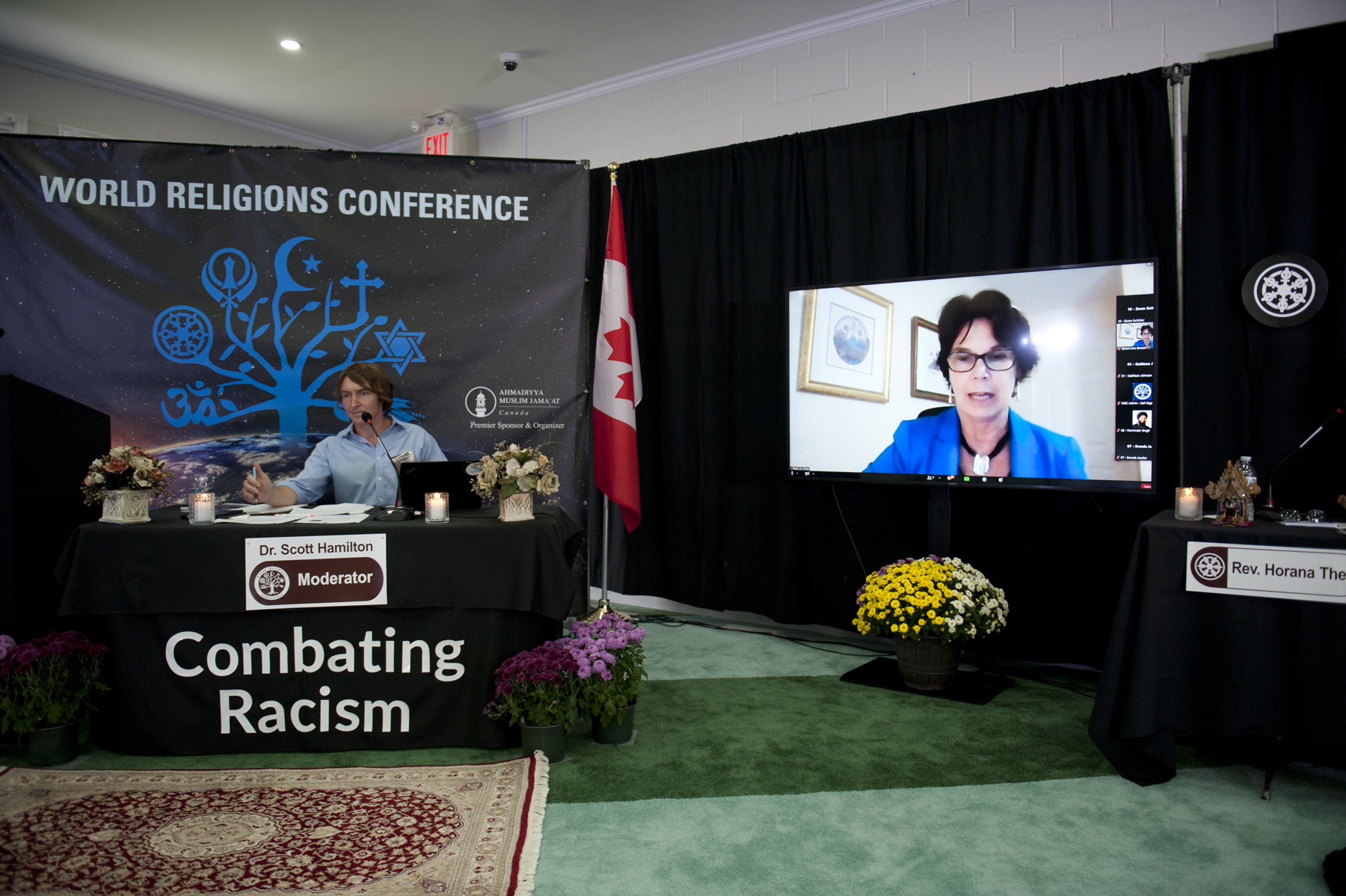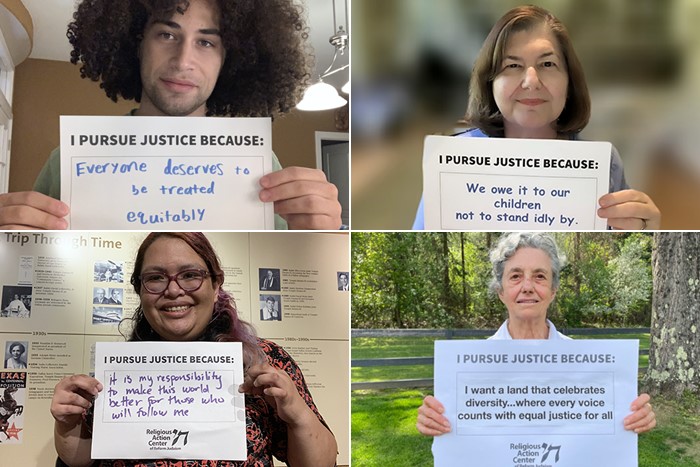Combating Racism
Judaic Perspective
by Rabbi Lori Cohen
Temple Shalom, Waterloo

Abstract of Theme Speech
Hi, I’m Rabbi Lori Cohen, from Temple Shalom in Waterloo, and I am delighted to be with you this afternoon to bring the Jewish perspective to our discussion about racism.
The Jewish tradition always begins by studying a text, to try to understand divine wisdom and to teach us how we are to live our lives.
In the Torah, the Book of Genesis, we have a detailed description of creation. Although I would frame this description as the realm of mythology, it means that the truths within it run deeper than a literal truth. In the second chapter, God realizes that there is no one to care for the earth and so God creates the first human being – adam, from the adamah, the earth. All other creatures were created in groups – flocks of birds, schools of fish, herds of cattle, and swarms of insects, but the human being was created alone.
The early rabbis ask the question, “Why was the human being created alone?” And the answer given in the Talmud is, “For peace amongst the created: that a person should not say my ancestry is greater than yours” (Sanhedrin 37a).
Can you imagine how the world might look if we all just heeded the message in this teaching! This is a divine truth – all of us were created from this one being, and no person or race is greater than another.
Another teaching answering the same question of why was the person created alone, is “To tell us the greatness of the Holy One; a person makes many coins with a single seal and they are all similar to one another. But the Holy One, stamped all people with the seal of Adam, and not one of them is like another.”
The essence and purpose of creation is the expression of our own unique individuality. We must not give up on our unique traditions. As Moses Mendelssohn wrote in his treatise Jerusalem in 1783, “Brothers, if you care for true piety, let us not feign agreement where diversity is evidently the plan and purpose of Providence. None of us thinks and feels exactly like his fellow man; why then do we wish to deceive each other with delusive words?
“Diversity is the plan and purpose…” Giving that up to conform is thwarting the purpose of God’s creation. While unity amongst is good, uniformity is not. We are strengthened by interacting with people who are different than we are. In fact, it is a prerequisite for truly growing as a person – and for being able to get along with others.
It is only when we live these truths in the world – that all humanity is created equal, that every human being is precious and unique, and that we are stronger when we interact with people who share different perspectives, are we truly entitled to say that we are created “b’tzelem Elohim” – in the image of God.
What does Judaism do to combat racism?
Throughout our 4000 year history, the Jewish people have often been the victims of hatred, prejudice and racism. Our historical record begins in slavery where we experienced the hatred and violence of oppression. The beginning of the book of Exodus tells the story of how the Israelites were oppressed into slavery in the land of Egypt. The Hebrew word for Egypt is “Mitzrayim” which means the “narrow place”. Originally it probably had to do with it being the land of the Nile River, but it is reinterpreted to mean “narrow perspective”. We all have our “mitzrayim”, our narrow places, where we journey through the world looking in only one way, one direction, and forget to stop and look around at other perspectives.
It is due to this historical beginning of the Jewish people, that we are told over and over again in our sacred scriptures, not to oppress or wrong the stranger, the one who is different, because hatred often surfaces when we are confronted by those who are different than us.
When a stranger sojourns with you in your land, you shall not do him wrong. The stranger who sojourns with you shall be to you as the native amongst you, and you shall love him as yourself; for you were strangers in the land of Egypt. (Leviticus 19:33-34)
You know the heart of the stranger because you were strangers in the land of Egypt. (Exodus 23:9)
We are called upon to be empathetic and compassionate. And not just to feel emotions but to actually do something concrete about it. To feed the hungry, free the oppressed and be a voice against injustice.
Imagine a world where we would live these truths…where the stranger is always protected and cared for! Imagine a world without strangers, where all people are members of an extended family!
Unfortunately, there is no tradition that can claim that it lives up entirely to its ideals. Soon after the exodus from slavery we read in the book of Numbers, the story about Moses’ marriage to a Cushite woman. The land of Kush was south of Egypt and the woman would have been black. Moses’ sister Miriam and brother Aaron were making fun of Moses and speaking out against him because of the woman that he married. Immediately God calls Miriam and Aaron to account, and Miriam is punished, ironically, with a white skin disease, for speaking against Moses and his wife. Thus, in our tradition God rushed in to protect the stranger, the one who was different because Miriam and Aaron failed in their responsibility to do this and suffered the consequences of it.
Where does prejudice and hatred come from?
Prejudice often exists against those who practice a different religion, have a different colour of skin, a different gender identification, or even based on age. It is possible for racism to occur between people of the same skin colour. Connected to this are prejudices based on ethnicity - cultural heritage, language, or dress code. Hatred can stem from historical situations and within particular contexts and conflicts, but often hatred is based on seeing some people as “other” and different. Ignorance is what often flames the feelings of prejudice.
With shame I can admit that within the Jewish community there is prejudice – prejudice against specific groups within Judaism. There have been outbursts of hatred aimed at Sephardic Jews from Ashkenazi Jews and reverse. There are problems between different denominations – Reform and Orthodox. We share so many things in common and yet how we are different is often what draws the most attention.
With shame I can admit that Jews of colour are not always welcomed into every Jewish community. This is a shanda (disgrace) given our own history. Before 1967 all Jews were considered “black” by much of the world, and it has only been recently that Jews are seen as “white” and “privileged”.
With shame I can admit that there is still some prejudice between Jews and other groups of people based on skin colour, religion and race. However, it is with pride that I can say that these instances are almost always dealt with by education, programming, text study and do not stem from people in positions of authority and within major organizations. But we need to be on the watch and to combat ignorance wherever it occurs.
What are the practical steps that Judaism takes to combat hatred and prejudice?
The Reform Movement, of which I am a part, has recently begun a Racial Justice Campaign. It comes at a critical moment. The last two years have seen a racial reckoning for those who have been systematically oppressed in the black and indigenous communities.
The campaign for racial justice has encouraged people to complete this sentence:
I pursue justice because…
Some of the answers have been:
Everyone deserves to be treated equitably.
We owe it to our children not to stand idly by.
It is my responsibility to make the world better for those who come after me.
I want a land that celebrates diversity…where every voice counts with equal justice for all.
We all need to take responsibility to make sure that hatred and prejudice be stopped. However, it takes all people of conscience and faith to work together at both the individual and community levels.
Rabbi Israel Salanter said, “Normally we worry about our own material well-being and our neighbour’s souls; let us rather worry about our neighbour’s well-being and our own souls”.
On the local level, Temple Shalom is proud to dwell in The Cedars…our sacred home and sanctuary that we share with a Christian church and a Muslim prayer group. It is truly a “house of prayer for all peoples”. At the Cedars we are able to meet and discuss and work on projects together. This year members of all Cedar congregations have worked to put in a community garden and an ecological environment. We build relationships with people when we accomplish a goal together. We need to find more projects and times when we can come together.
I have hope that we are working towards a better future. We are more aware of incidences of hatred and systematic oppression and conferences like this will hopefully have an influence on concentric circles of people in our community and beyond.
The Jewish faith teaches that people need to work to achieve peace and harmony between all human beings because there can only be lasting peace when there is justice and equality for all.
People should be encouraged to respect every human and to be tolerant of difference. If this ideal situation could be created on Earth, there would be no prejudice or discrimination. This is hard work, but it is our sacred obligation.
The Jewish greeting Shalom means 'peace', but specifically an 'overall peace' or wellbeing. It is a state of truth, justice, harmony between one person and another, one group and another.
I will end with a quote by Rabbi Jonathan Sacks, “Peace can be agreed around the conference table, but unless it grows in ordinary hearts and minds, it does not last. It may not even begin.”



